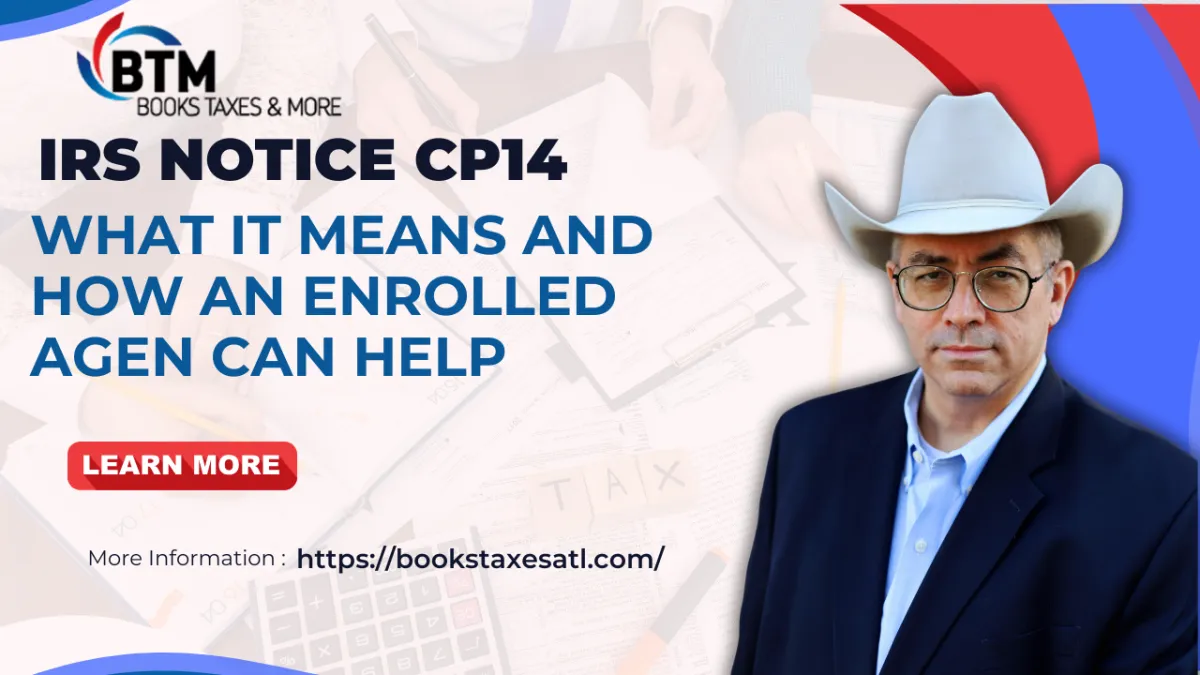
Understanding IRS Notice CP14: What It Means and How an Enrolled Agent Can Help
No one likes to receive mail from the IRS, especially when it says money is owed. One of the most common notices issued by the IRS is Notice CP14, which informs taxpayers that they have a balance due on their federal income taxes. While the notice can feel alarming, it is not the end of the world. With the right guidance and a timely response, the issue can often be resolved smoothly. An Enrolled Agent is especially equipped to help navigate this process.
What Is IRS Notice CP14?
IRS Notice CP14 is typically the first official notice sent by the IRS to inform a taxpayer that they owe money on their taxes. It follows the processing of a filed return or correction by the IRS and reflects a balance that remains unpaid.
The notice outlines the following key details:
The tax year in question
The amount owed, including tax, penalties, and interest
The due date for payment
Payment options and instructions
Consequences of not paying by the due date
Receiving this notice means the IRS has recorded a balance due in its system. If no action is taken, the IRS may proceed with additional notices, increased penalties, and eventually collection efforts.
Why Did I Receive a CP14 Notice?
There are several reasons why a taxpayer might receive a CP14 notice:
The return was filed with a balance due, but the payment was not submitted
The IRS made a change or correction that resulted in a higher tax liability
Estimated tax payments were lower than expected
Withholding was insufficient during the year
In some cases, the taxpayer may not agree with the amount shown, or they may not have realized a balance was owed at all.
What Are the Options?
Once a CP14 notice is received, it is essential to respond promptly. Taxpayers typically have 21 days to pay the amount before additional penalties and interest are added. Several options are available depending on the individual’s situation:
Pay in Full: The simplest option is to pay the amount in full by the due date listed on the notice. This avoids further interest and penalties.
Set Up a Payment Plan: If full payment is not possible, the taxpayer can request an installment agreement to make monthly payments over time.
Request a Penalty Abatement: If the debt includes penalties and the taxpayer has a good compliance history or a valid reason for late payment, they may qualify for penalty relief.
Dispute the Balance: If the taxpayer believes the amount is incorrect, they can file a dispute with the IRS. This requires providing documentation to support their position.
Request Hardship Relief: Taxpayers facing financial hardship may be able to qualify for Currently Not Collectible (CNC) status or submit an Offer in Compromise (OIC).
How an Enrolled Agent Can Help
An Enrolled Agent (EA) is a federally licensed tax professional with the authority to represent taxpayers before the IRS. When a CP14 notice is received, an EA can provide expert guidance and representation to ensure the taxpayer’s rights are protected and the issue is resolved effectively. The Enrolled Agent is the best person to file for hardship and many installment agreements.
Here’s how an Enrolled Agent can assist:
Review the Notice: An EA can examine the CP14 notice and determine whether the balance due is accurate, based on IRS transcripts and the original return.
Explain the Options: Enrolled Agents are well-versed in IRS procedures and can explain all available payment and resolution options in clear terms.
Negotiate with the IRS: If a payment plan, penalty relief, or dispute is necessary, the EA can handle the communication and paperwork directly with the IRS.
Prevent Future Issues: An EA can help the taxpayer adjust withholding, make estimated payments, or implement other strategies to avoid future tax balances.
Final Thoughts
Receiving IRS Notice CP14 is not uncommon, but it should not be ignored. It is an early step in the IRS collection process, and resolving it quickly can save time, money, and stress. Whether the goal is to pay the balance, request relief, or dispute the charge, taking action is key.
Steve Perry, Enrolled Agent from Books, Taxes & More brings the knowledge, experience, and authorization to act on behalf of the taxpayer. With professional support, individuals and businesses can confidently address the notice and regain control of their tax situation.
Need help responding to a CP14 notice? Reach out to Steve Perry at Books, Taxes & More today to explore your options and get the resolution you deserve.
